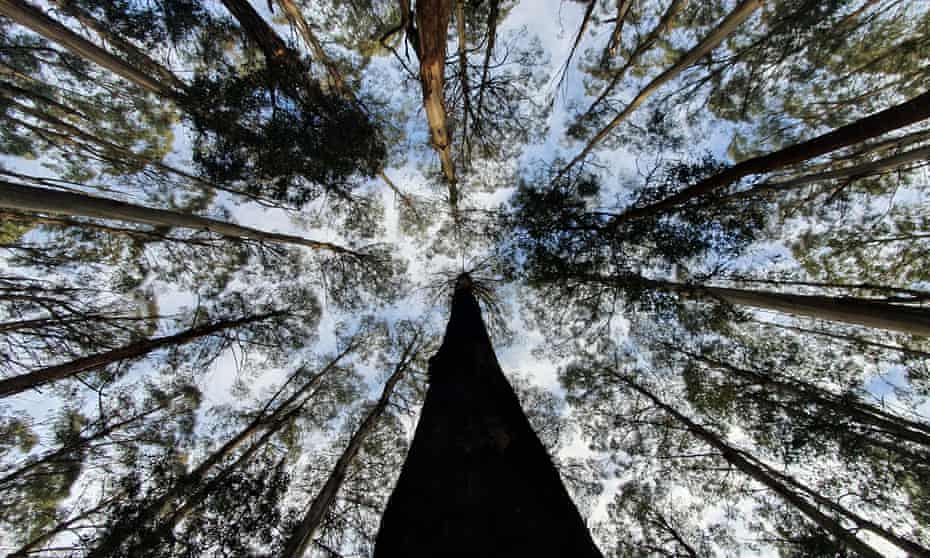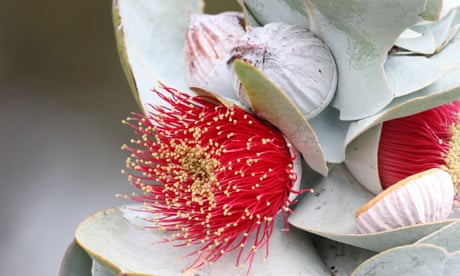Eucalyptus regnans, commonly known as mountain ash, swamp gum and stringy gum, named Australia’s favourite eucalypt

The winner of the 2022 Eucalypt of the Year, Eucalyptus regnans, is the tallest of all eucalypts and the tallest flowering tree in the world.
Photograph: Cathy Cavallo, Remember the Wild
Donna Lu
THE GUARDIAN
Donna Lu
THE GUARDIAN
Wed 23 Mar 2022 03.07 GMT
The mountain ash has towered above its competition to be voted Australia’s favourite eucalypt.
Eucalyptus regnans, commonly known as the mountain ash in Victoria, the swamp gum in Tasmania, and the stringy gum, has won a public vote to be named the 2022 Eucalypt of the Year.
Eucalyptus regnans is the tallest of all eucalypt species and the tallest flowering tree in the world, said Linda Baird, the chief executive of Eucalypt Australia, a charitable trust that runs the poll.

Eucalypt of the Year: 25 species from tall to small vie for top tree
“The tallest ones are usually younger than the oldest ones,” Baird said. “They grow super tall to get their canopy into the light and then they have a habit of dying out at the top – the top 10 to 15 metres.”
The tallest regnans lives in Tasmania’s Huon Valley. Named Centurion, it towers at 100.5 metres high. Another notable tree, named Gandalf’s Staff, could be 500 years old and is found in the Styx Valley.
Victoria’s tallest mountain ash is along the Black Spur road – an 86-metre-high tree that grew after the area was burnt during a bushfire in 1939, Baird said.
Eucalyptus regnans is one of an estimated 80 species of eucalypt that are killed by fire, and can only regenerate from seed.
Other eucalypt species have epicormic buds beneath the bark, which lie dormant until the tree is damaged by fire. The buds then sprout, resulting in fluffy-looking regrowth.
Eucalyptus regnans trees “don’t normally recover from fire well”, Baird said. The species takes around 20 years to grow to maturity, flower and seed – making the increasing severity and frequency of bushfires with climate change an existential threat. “If you have fires within seven-year gaps like what we’ve been having, those trees can’t get fertile,” Baird said.
The trees can be found in higher rainfall areas of Victoria’s eastern highlands, south of the Great Dividing Range, as well as on Mt Macedon and in the Otway Ranges.
The mountain ash has towered above its competition to be voted Australia’s favourite eucalypt.
Eucalyptus regnans, commonly known as the mountain ash in Victoria, the swamp gum in Tasmania, and the stringy gum, has won a public vote to be named the 2022 Eucalypt of the Year.
Eucalyptus regnans is the tallest of all eucalypt species and the tallest flowering tree in the world, said Linda Baird, the chief executive of Eucalypt Australia, a charitable trust that runs the poll.

Eucalypt of the Year: 25 species from tall to small vie for top tree
“The tallest ones are usually younger than the oldest ones,” Baird said. “They grow super tall to get their canopy into the light and then they have a habit of dying out at the top – the top 10 to 15 metres.”
The tallest regnans lives in Tasmania’s Huon Valley. Named Centurion, it towers at 100.5 metres high. Another notable tree, named Gandalf’s Staff, could be 500 years old and is found in the Styx Valley.
Victoria’s tallest mountain ash is along the Black Spur road – an 86-metre-high tree that grew after the area was burnt during a bushfire in 1939, Baird said.
Eucalyptus regnans is one of an estimated 80 species of eucalypt that are killed by fire, and can only regenerate from seed.
Other eucalypt species have epicormic buds beneath the bark, which lie dormant until the tree is damaged by fire. The buds then sprout, resulting in fluffy-looking regrowth.
Eucalyptus regnans trees “don’t normally recover from fire well”, Baird said. The species takes around 20 years to grow to maturity, flower and seed – making the increasing severity and frequency of bushfires with climate change an existential threat. “If you have fires within seven-year gaps like what we’ve been having, those trees can’t get fertile,” Baird said.
The trees can be found in higher rainfall areas of Victoria’s eastern highlands, south of the Great Dividing Range, as well as on Mt Macedon and in the Otway Ranges.
In Tasmania, the species is found in the Huon and Derwent Valleys, as well as inland across the north of the state.
The mountain ash faced stiff competition in the public vote from the red flowering gum, Corymbia ficifolia, which is endemic to south-west Western Australia.
A 40-year-old Eucalyptus regnans tree was also named the best eucalypt in show at the 2022 Victorian Native Bonsai Club’s exhibition, Baird said.

Linda Baird of Eucalypt Australia hands Quentin Valentine the best eucalypt in show award for his 40-year-old mountain ash bonsai.
Photograph: Eucalypt Australia
The terms eucalypt, Eucalyptus and gum tree are often used interchangeably, but have distinct meanings. Eucalyptus is a type – a genus – of eucalypt (plants belonging to the tribe Eucalypteae). Plants belonging to the Eucalyptus, Angophora and Corymbia genera are known as gum trees in Australia, named for the sticky substance that many produce.
The Eucalypt of the Year result was announced on National Eucalypt Day on Wednesday.
The terms eucalypt, Eucalyptus and gum tree are often used interchangeably, but have distinct meanings. Eucalyptus is a type – a genus – of eucalypt (plants belonging to the tribe Eucalypteae). Plants belonging to the Eucalyptus, Angophora and Corymbia genera are known as gum trees in Australia, named for the sticky substance that many produce.
The Eucalypt of the Year result was announced on National Eucalypt Day on Wednesday.











